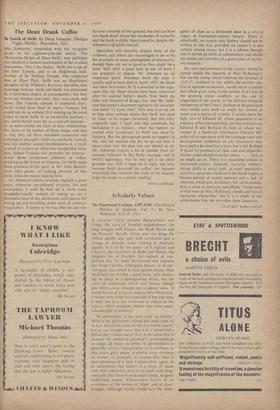Scholarly Values
The Fourteenth Century, 1.307-13.99. (The Oxford History- of England. Vol. 5.) By 11 ay McKisack. (0.U. P.. 35s.) A CENTURY which includes Bannockburn and Crecy, the wars of Scottish independence, the long struggle with France. the Black Death and the Peasants' Revolt, Which sees two kings die violent deaths and ends with revolution and a change of dynasty. lacks nothing in dramatic quality. It is lit by the poetry of Langland and Chaucer. the mysticism of Rolle and Hilton, the religious lire of Wycliffe, the exploits of con- dottiere like Sir John Hawkwood and captains like Hugh Calveley. Unhappily history, in its cur- rent guise. has turned its face against drama. Miss McKisack has written a good book. fully deserv- ing its place in a distinguished series:' but the sense of excitement which real history should give filters away through the iteademic sieve. It would be'out of pace to criticise NI iss McKisack, who has done what was expected of her and done it well: but it is not irrelevant to reflect on the pass to which academic history has come under a deadweight of learning.
'No philosophy.' it has been said, no history.' What is the philoSophy behind this book (and. to be fair, behind the series of which it Forms a part)? Let us say straight awit■ that it is a conservative philosophy. Conservatk c. first, in the sense that it assumes the medileval chronicler's predisposition to judge all issues in terms of personalities is generally correct. Conservative in its tendency to play down great issues, to whittle away divisions on matters of principle, to assume that what is best administered is best. Conservative, again, in its assumption that history is a series of issues with little coherence, each to be dealt with prag- matically, that there is no dramatic unity, no great underlying causes. Conservative (very) in its avoidance of the notion of 'class' and of class- struggle although (many would say) the emer- gence of class as a dominant issue is a cenital aspect of fourteenth-century history.' There is, admittedly, no reason why history should not be written in This way, provided we realise it is one version among many; but it is a solemn thought that it should go forth as authoritative and mould . the minds and attitudes of a generation of univer- sity students.
My own interpretation' of the century would be almost totally the opposite of Miss McKisack's. For me the slump which followed the famines of 1315-17, confined by her within the narrow con- text of agrarian economics, stands out as a central fact which gives unity to the period. It is a key to the growing social conflicts, to the rise of oligarchies in the towns, to the dubious financial manoeuvres of the Crown, perhaps to the persistent wars which were both an outlet for tension at home and a source of revenue. I cannot share her high view of Edward III, whose popularity is no measure of his statesmanship, nor her strictures on Edward II and Richard II, both of whom suc- ceeded to a bankrupt inheritance. Edward III's policy of co-operation with the baronage (and with unscrupulous syndicates of city financiers) may have paid a dividend for a time; but it left Richard II faced by problems of class rule and oligarchic faction unparalleled in earlier times. . . . And so 'we might go on. There is a mounting tension in fourteenth-century England, accruing violence. abrupt shifts in social rank, as wool speculators and army careerists climb on to the band-wagon, a blatant pursuit of vested interests and a lack of cohesion which give its history, for all its remote- ness, a sense of nearness and affinity. I wish more of this were in Miss McKisack's book, and less of measured scholarship; but it is a mark of her achievement that she provokes these questions.
EOFFREY BARRA(






































 Previous page
Previous page